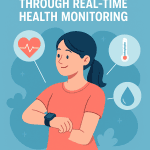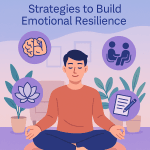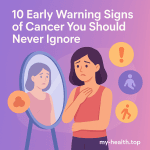Cancer doesn’t arrive with a grand announcement. It often starts quietly, with subtle signs our bodies whisper before they scream. The tragedy is that many people ignore these signs, attributing them to stress, age, or everyday ailments. But when it comes to cancer, early detection is nothing short of lifesaving. Recognizing these early warning signs can mean the difference between successful treatment and a devastating outcome.
Let’s dive deep into the 10 early warning signs of cancer you should never ignore—arming you with knowledge, empowering you to act, and perhaps saving a life, maybe even your own.
Unexplained Weight Loss
Losing weight without trying may sound like a dream, but in reality, it can be a nightmare in disguise. If you suddenly drop more than 10 pounds without changes to your diet or exercise, your body might be signaling a red flag. Unexplained weight loss is one of the first noticeable signs of cancers such as stomach, pancreas, lung, or esophageal cancer.
Why? Cancer cells consume the body’s energy, and tumors may change how your body processes nutrients. Pay attention. If the scale keeps dropping and you’re not trying, it’s time for a check-up.
Persistent Fatigue
We all feel tired after a long week, but cancer-related fatigue doesn’t go away with rest. It’s deep, ongoing exhaustion that disrupts your daily life. Blood cancers like leukemia often cause this symptom, as do colon and stomach cancers due to internal bleeding.
This kind of fatigue is relentless. You might find yourself struggling to focus, dragging yourself through the day, and feeling drained even after a good night’s sleep. When rest isn’t enough, something deeper may be wrong.
Chronic Pain
Pain is how your body calls for help. Persistent headaches, back pain, or aches that don’t improve might be your body waving a red flag. Pain associated with cancer often doesn’t respond to typical treatments and may worsen over time.
Bone cancers, brain tumors, or even ovarian cancer can manifest this way. Of course, not every pain signals cancer—but pain that doesn’t resolve deserves medical attention. Don’t brush it off.
Changes in the Skin
Your skin is your largest organ and often the first to show signs of internal trouble. Sudden changes in moles, new growths, or yellowing of the skin and eyes (jaundice) are all signs that warrant investigation.
Skin cancers like melanoma often start as an innocent-looking mole. Use the ABCDE method: Asymmetry, Border irregularity, Color variation, Diameter over 6mm, and Evolving shape. When it comes to your skin, vigilance is crucial.
Unusual Bleeding
Bleeding that occurs outside of your normal cycle—or in places it shouldn’t—can indicate cancer. For example, blood in the stool might suggest colon cancer, while coughing up blood could point to lung cancer.
Postmenopausal bleeding, unexplained vaginal spotting, or unusual bruising could signal endometrial or blood cancers. The golden rule? Any unexplained bleeding should be evaluated immediately.
Persistent Cough or Hoarseness
That lingering cough or raspy voice might not just be from allergies or a cold. When a cough lasts more than three weeks—especially if it worsens—it could be a sign of lung, throat, or thyroid cancer.
Listen to your lungs and your voice. If your cough is dry, harsh, and persistent, or your voice changes without cause, speak to your doctor. It might be nothing, but it’s better to be cautious.
Lumps or Swelling
Finding a lump under your skin—especially one that doesn’t go away—is alarming and for good reason. Breast cancer is the most well-known for this sign, but testicular, lymphatic, and soft tissue cancers can present similarly.
What matters is the persistence and feel of the lump. Is it hard? Immobile? Growing? Don’t wait for it to hurt. Most early cancerous lumps are painless. Get them checked—early.
Difficulty Swallowing
Trouble swallowing, known medically as dysphagia, may be a warning sign of esophageal, throat, or stomach cancer. It’s often mistaken for acid reflux or a sore throat.
If swallowing becomes painful, food gets stuck, or you’re unintentionally avoiding meals, don’t delay. Gradual changes in eating should never be ignored, especially if paired with weight loss.
Changes in Bowel or Bladder Habits
Frequent urination, constipation, diarrhea, or changes in stool color or size can all hint at underlying issues—sometimes even bladder, prostate, or colon cancer.
It’s easy to dismiss these changes as diet-related or stress-induced, but when they persist, it’s time for a deeper look. Our digestive systems are sensitive and responsive. Don’t wait until it’s too late.
Unhealing Sores or Mouth Ulcers
Mouth ulcers that linger longer than two weeks or sores that don’t heal elsewhere on the body may be warning signs. Oral cancer, particularly in smokers or heavy drinkers, can start this way.
Ulcers with white or red patches, bleeding, or pain while chewing are especially concerning. If your body’s natural healing process seems stuck, listen—it’s trying to tell you something important.
10 Early Warning Signs of Cancer You Should Never Ignore
Recognizing these signs isn’t about panicking—it’s about being proactive. Cancer doesn’t play fair, but it does leave clues. Understanding these symptoms can save lives, possibly your own.
It’s not just about spotting them—it’s about acting on them. Talk to your doctor, get screened, and encourage loved ones to do the same. When caught early, many cancers are highly treatable. You hold more power than you think.
FAQs
Yes. Many of these symptoms can be due to non-cancerous conditions. But persistent signs warrant professional evaluation.
If any symptom lasts more than two weeks or worsens over time, consult your doctor.
No. Different cancers show different early signs. These are common across various types but not exhaustive.
Yes. Some cancers are asymptomatic in early stages, which is why routine screenings are vital.
Absolutely. Several signs together may indicate a more urgent need for evaluation.
Healthy lifestyle choices, regular check-ups, avoiding tobacco, limiting alcohol, and knowing your family history help significantly.
Conclusion
Cancer isn’t unbeatable—it’s just sneaky. The earlier you catch it, the greater your chances of living a long, healthy life. Your body speaks to you every day. The question is—are you listening?
Don’t ignore the whispers. They could save your life.








Post a comment